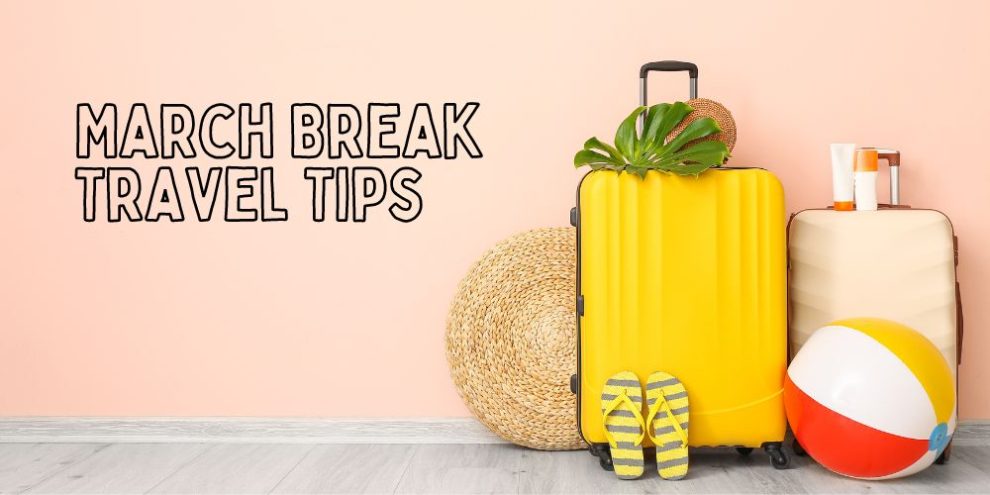
As March Break approaches, many travellers will be crossing the border between Canada and the United States. And that means delays! To help make the process smoother, the Canada Border Services Agency (CBSA) has provided some travel tips and reminders for anybody heading out of Canada for March Break.
1. Plan Ahead
To make your trip smoother, the CBSA recommends planning and checking border wait times and alternate ports of entry. If you're crossing by land, try to avoid peak hours by crossing in the early morning.
2. Keep Your Travel Documents Handy
Another way to help save time is to make sure you have your travel documents handy. Have one person be in charge of all the documents and keep them in a designated place. That way, it's less likely that something will go missing.
3. Use An Advance CBSA Declaration
Are you arriving at the Toronto, Vancouver, Montreal, Winnipeg, Halifax, Québec City, Ottawa, Billy Bishop, or Calgary International Airport? If so, you can save time by using the Advance CBSA Declaration feature in ArriveCAN. The app will let you make your customs and immigration declaration before arrival, saving you time when you land. You'll also get to take advantage of express lanes to get to airport kiosks or eGates faster.
4. Letters Of Consent
If you share custody, when travelling with your children, it's recommended you carry a consent letter. This letter authorizes you to travel together without the other parent present. You should also carry this letter if you're not the parent/legal guardian. You can find information on consent letters on the Government of Canada website.
In addition to the letter, it's recommended that you bring copies of any legal custody documents. You should also arrive in the same vehicle as the minor, to avoid any problems or delays.
Border Services is always on the lookout for missing children and may need to ask additional questions if you don't have the necessary documentation, creating further delays.
5. Leave The Cannabis At Home
If you are bringing cannabis in any form, including oils containing THC or CBD, across the border, you must have a permit or exemption authorized by Health Canada. (A medical prescription does not count as authorization.)
Bringing cannabis in or taking it out without these permissions is a serious criminal offence. Even with legalization, you could be subject to arrest and prosecution.
6. Remember Your Exemption Limits
If you're a resident returning to Canada and have made purchases or picked up online purchases outside of Canada, be aware of your personal exemption limits. To determine how much money will be owed on purchases coming into Canada, you can use the CBSA duty and tax estimator.
7. Declare Goods
When entering Canada, all travellers must declare any goods purchased or received while out of the country. Be sure you have all your receipts and, like your travel documents, keep them in one place to avoid delays.
If you're travelling with firearms or other restricted/prohibited goods, review the CBSA rules online before you cross the border.
8. Don't Import Raw Poultry Products
To prevent the spread of Highly Pathogenic Avian Influenza, the CBSA advises against importing raw poultry products or by-products into Canada. Certain U.S. states affected by the disease are subject to restrictions on the importation of live birds, bird products, and by-products. If you bring poultry products, be prepared to provide evidence of their origin at the border.
9. Be Aware Of Rules Around Indigenous Medicines and Ceremonial Goods
Indigenous Peoples in Canada can bring traditional medicines and sacred items, such as sage, cedar, sweetgrass, peyote, and tobacco, across the border, however, plant material is subject to regulation and inspection.
10. Have Paperwork For Your Pet
Travellers with pets or those wanting to import animals into Canada must ensure they have the right paperwork at the border to meet Canada's import requirements.
The Government of Canada has a helpful tool for determining what you need based on the type of animal you're travelling with.
11. Honesty Is The Best Policy
The most important travel tip for March Break (or any time for that matter) is to be open and honest with the CBSA officer and ask for help if unsure about what to declare. While CBSA officers are sometimes painted in a bad light, they're there to help you.
Being upfront will help you get where you are going quicker and easier so that you can start enjoying your holiday!
For more information, visit the CBSA website or call 1-800-461-9999. You can also check out this video for more travel tips.
RELATED: Fun March Break activities for the family that are close to home ...










